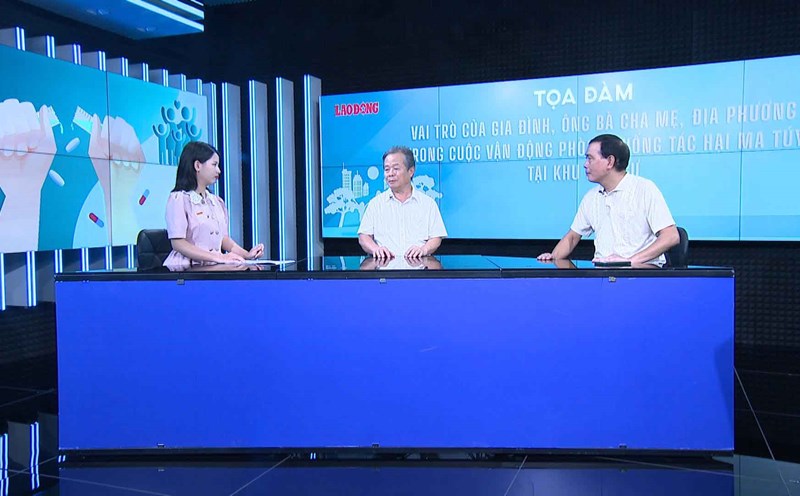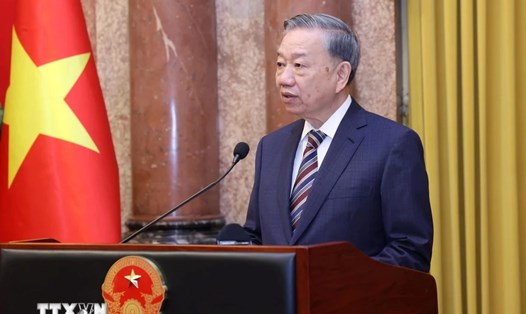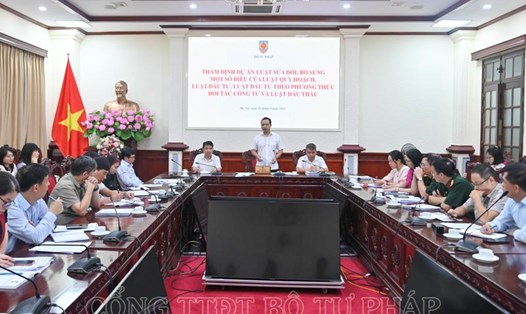“Right role, right lesson” and the role of the leader
At the 37th session, the National Assembly Standing Committee commented on the Government's report on anti-corruption work in 2024. Presenting the review report, Chairwoman of the National Assembly's Judicial Committee Le Thi Nga affirmed that the fight against corruption and negativity (PCTNTC) continues to be promoted and made breakthroughs; corruption continues to be contained and prevented.
However, the inspection agency commented that a significant number of cadres, party members, civil servants and public employees still showed signs of degradation in political ideology, ethics, lifestyle, "self-evolution", "self-transformation" leading to corruption, waste, negativity, and criminal prosecution, including high-ranking leaders.
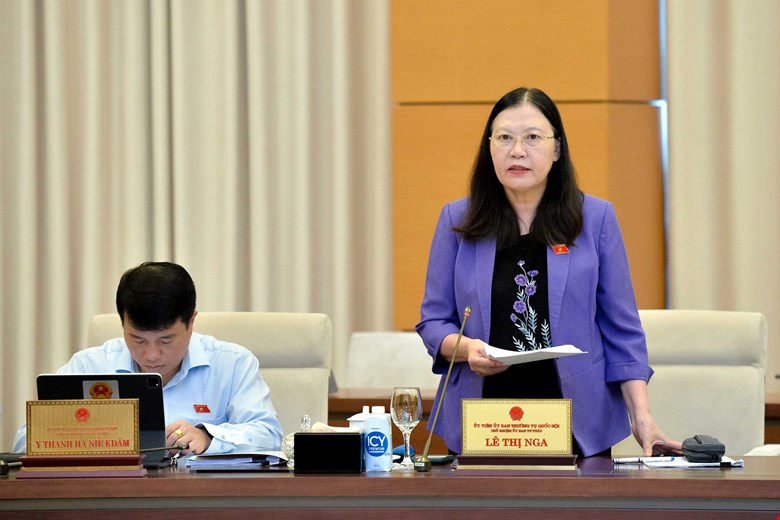
According to the Judicial Committee, the work of self-inspection and self-detection of corruption within the organization has not changed. Very few corruption cases and cases are discovered through self-inspection.
Looking back at prominent cases involving leading officials as well as the conclusions of the Central Inspection Committee, it can be seen that the common point is that many organizations, party bases, and individuals violated the principle of "democratic centralism".
For example, in the Press Release of the 48th Session of the Central Inspection Commission held on October 1 and 2, 2024, this agency reviewed the inspection results when there were signs of violations and the review results, and proposed disciplinary action against the Party Executive Committee of the People's Committee of Tuyen Quang province.
According to the Central Inspection Commission, the Party Executive Committee of the Provincial People's Committee violated the principle of democratic centralism and working regulations; lacked responsibility, loosened leadership and direction, allowing the Provincial People's Committee and many organizations and individuals to seriously violate Party regulations and State laws in organizing the implementation of Package No. 26 of the Tuyen Quang - Phu Tho Expressway Project (implemented by Thuan An Group Joint Stock Company); a number of cadres and Party members, including key cadres of the province, violated Party regulations and State laws on preventing and combating corruption and negativity, and violated regulations on what Party members are not allowed to do and the responsibility to set an example.
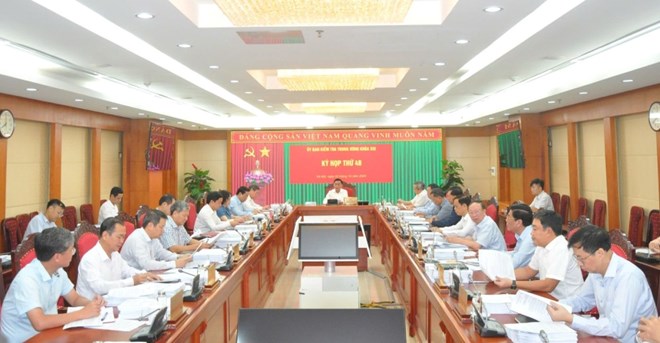
Or when reviewing the Report proposing disciplinary action against a number of Party organizations and Party members who violated the Party Committee of Phu Tho province, the Central Inspection Commission found that: The Standing Committee of the Provincial Party Committee for the 2010-2015 term, the Party Executive Committee of the Phu Tho Provincial People's Committee for the 2011-2016 term violated the principle of democratic centralism and working regulations; lacked responsibility, loosened leadership and direction, allowing the Provincial People's Committee and many organizations and individuals to seriously violate Party regulations and State laws in organizing the implementation of projects and bidding packages carried out by Phuc Son Group Joint Stock Company; many cadres and Party members, including key cadres of the province, degraded in political ideology, ethics, lifestyle, violated Party regulations and State laws on anti-corruption, violated regulations on what Party members are not allowed to do and the responsibility to set an example.
In these two localities, the Central Inspection Commission determined the responsibilities of relevant individuals and groups, including former Tuyen Quang Provincial Party Secretary Chau Van Lam and former Phu Tho Provincial Party Secretaries: Ngo Duc Vuong, Nguyen Doan Khanh, Hoang Dan Mac...
The above examples show that in many localities there exists a reality: The boundary between leadership and management is difficult to distinguish, easily leading to excuses, substitution or loosening of the Party's leadership role.
The Party's leadership method is clearly demonstrated in the leadership role and relationship between the collective and the individual leader. The principle of democratic centralism is one of the top principles.
In the process of performing assigned tasks, in some localities and Party organizations, the leaders themselves were not "in the right role, not knowing their lesson" so they violated the principle of democratic centralism, abused their power in performing their duties according to regulations... This partly led to the situation where "very few corruption cases and cases were discovered through self-inspection" as assessed by the Judicial Committee above.
Mechanisms to enhance self-inspection and monitoring
Discussing solutions to improve the quality of staff, Prof. Dr. Tran Van Phong (Ho Chi Minh National Academy of Politics) said: It is necessary to increase the individualization of responsibility - clearly defining the responsibilities of each level, each sector, each individual in the apparatus, especially the responsibility of the individual leader.
This contributes to ending the situation of “no one cries for the common father”, “mistaking the role”, one person pushing work and responsibility to another; this department, this organization pushing, “kicking” responsibility to another organization, refusing to perform assigned duties and tasks.
Carry out well the inspection and supervision work of the implementation of the motto "right role, right lesson" of each Party Committee, each level of government, each industry, each leadership position, each individual cadre. Improve and innovate the process, methods, and skills of inspection and supervision work to ensure objectivity, democracy, science, synchronization, and unity.
In particular, attention should be paid to mechanisms and measures to proactively detect early in order to prevent and stop the phenomenon of "mistaking roles", "wrong roles", "not knowing the lesson" or "right roles but not knowing the lesson"... This contributes to limiting the manifestation of covering up, avoiding, and not daring to frankly point out the nature, characteristics, and level of danger in violations in performing functions and tasks.
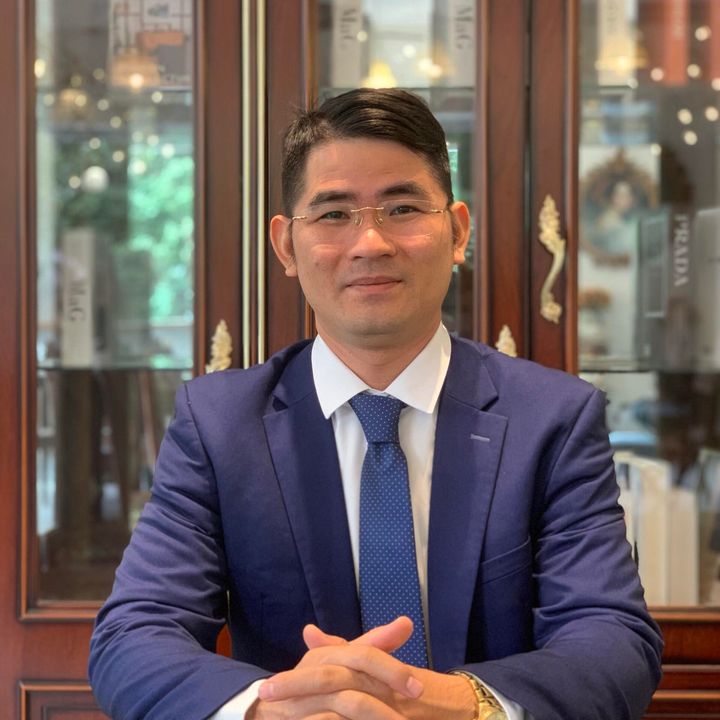
Dr. Cu Van Trung - Director of the Institute for Policy Research and Social Issues - said that inspection and supervision work is a very important content in the Party's leadership process, a function, leadership method, and regular task of the Party.
Promoting the role of inspection and supervision of Party committees and Inspection Commissions at all levels, along with detecting and strictly handling all acts of taking advantage of inspection and supervision for corruption and negativity, is one of the important solutions. Performing this task well will be a breakthrough step in the Party's self-inspection and supervision work.
Check and monitor to get the job done better
One of the key tasks emphasized by General Secretary To Lam in the article "Continuing to strongly innovate the Party's leadership and governance methods, an urgent requirement of the new revolutionary stage" is: "Continue to innovate inspection and supervision work; promote the application of information technology and digital transformation in Party activities. The Party inspects and supervises so that work is performed better, resolutions are implemented effectively; the Party and State apparatus operate effectively, efficiently, in accordance with policies and guidelines, with the right people and the right jobs; promptly detect new factors, good and creative ways of doing things; correct and adjust deviations, deviations or prevent wrongdoings and violations of Party regulations and State laws".
Inspection and supervision must protect cadres who dare to think, dare to do, and dare to make breakthroughs.
During the 13th tenure, the Central Executive Committee issued Regulation No. 22-QD/TW on the Party's inspection, supervision and discipline work (Regulation 22).
Regulation 22 has a separate article regulating the principles of inspection and supervision. The notable new point is that inspection and supervision must promptly detect new and positive factors to promote, must protect what is right, protect good people, and cadres who dare to think, dare to do, dare to take responsibility, and dare to make breakthroughs for the common good.



